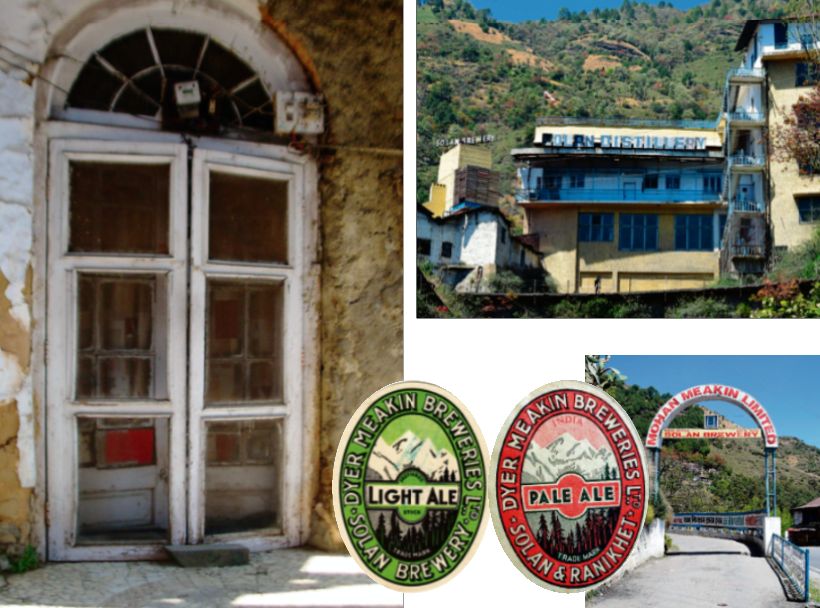
(Clockwise) The main door of Dyerton in Shimla where Edward Dyer and his family lived, Solan Brewery of Mohan Meakin Limited, and the logos of two beer brands of Dyer Meakin Breweries Ltd.
Raaja Bhasin
One of the most infamous names in Indian history was closely connected with the most famous beer of the time. The lives of the Dyer family, originally from a small village in Devon, England, had been interwoven with India from the early years of the nineteenth century. Then, a couple of generations later, in 1919, the sixth child of Edward and Mary Dyer, Reginald -- fondly called Rex by the family -- went down in history as ‘The Butcher of Amritsar’. On the orders of General Reginald Dyer, soldiers had fired on an unarmed crowd gathered in the Jallianwala Bagh.
Around 1850, Reginald Dyer’s father, Edward, a trained engineer, with a working knowledge of sciences, travelled up to Mussoorie where his brother John was living. More experiments than successful businesses, breweries had by then had been tried near Mussoorie by Sir Henry Bohle and in Shimla by businessman and philanthropist Barratt; there was another failed enterprise at the other little hill station of Kasauli. (The last may also have been an early attempt by Edward Dyer). After these failures, it was generally believed that beer could not be successfully made in India and it continued being shipped out from Britain.
By mid-1850s, Edward Dyer moved to Kasauli to set up a brewery. And within a short time, Asia’s first beer, ‘Lion’, was quenching the thirst of British Tommies across the country. The huge success of an Indian-made beer soon brought Edward Dyer into the limelight and opportunities rapidly started coming his way. Around 1860, Murree Brewery Company asked Edward to join them as their manager at Murree, which is now in Pakistan.
In mid-1860s, the Dyer family moved to Shimla where Edward obtained a house called Ladyhill and renamed it Dyerton. Close by, he built what the town called the ‘New Brewery’. Somewhat crumbling, the house still stands and bears the name Edward gave it, while the area is still called the ‘Beer Khana’; in the neighbourhood, Edward sent his son, Reginald to study at Bishop Cotton School. From Shimla, Edward stepped a little away to Solan -- that lies roughly halfway between the former summer capital of British India and the plains. The one at Solan was to become a turning point in Edward Dyer’s life and in the story of beer-making in India.
The source of fresh water that had once been abundant for the plant at Kasauli gradually dried up with the demands of a growing military and civil population and this plant was converted into a distillery. At Solan, on the fringes of an oak and rhododendron forest, the water was abundant. From Kasauli, the manufacture of beer shifted to Solan — and when the railway line arrived in 1903, it ran right through the brewery where cases would be loaded onto wagons for transportation all over the country. In 1917, Edward Dyer and Company announced their prices: “Pale Ale and Stout at Re 1, annas 6 per gallon (this would be a little less than a rupee and a half) and 10 years old malt whisky at Rs 17 and Rs 15 per gallon”. As far as beer was concerned, Dyer’s ‘better beer’ had won the price and quality war.
It was after the First World War, and at least partially due to the fallout of the Jallianwala Bagh massacre in Amritsar, that Edward Dyer joined hands with another businessman HG Meakin and the companies merged to be called, ‘Dyer Meakin Breweries’. This was a public company listed on the London Stock Exchange. Another product, ‘K Brand Ale’, was added which became fairly popular in army circles and the advertisements went ‘Say Solan…Obtainable Everywhere’. Meakin gave another impetus to the business and built plants at Ranikhet, Dalhousie, Chakrata, Darjeeling and Kirkee.
In 1949, two years after India’s Independence, NN Mohan purchased the major stake in the company -- though it was renamed ‘Mohan Meakin Breweries’ only in 1967. And later, as the company expanded its operations beyond spirits and beer, the word ‘Breweries’ was dropped. After the death of NN Mohan, his eldest son Colonel VR Mohan took over and after him, his brother Brigadier Kapil Mohan took the charge of the company.
(The writer is an author, historian and journalist)
Join Whatsapp Channel of The Tribune for latest updates.



























